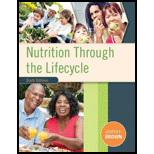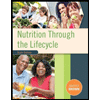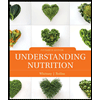
Concept explainers
To explain: The concern about Person M’s diet.
Introduction: Breast feeding is an important phase in the life of both the mother and the infant. Breast milk provides the necessary nutrients, immunological functions and psychological support to the growing infant in his early stages of development. It also has several benefits to the mother like burning of the calories gained during pregnancy and also relaxation of the body by the release of oxytocin hormone.
To explain: The advice for Person M about her weight loss plans and eagerness to return to exercise.
Introduction: Breast feeding is an important phase in the life of both the mother and the infant. Breast milk provides the necessary nutrients, immunological functions and psychological support to the growing infant in his early stages of development. It also has several benefits to the mother like burning of the calories gained during pregnancy and also relaxation of the body by the release of oxytocin hormone.
To explain: Whether Person M or Person D needs any vitamin/mineral supplements.
Introduction: Breast feeding is an important phase in the life of both the mother and the infant. Breast milk provides the necessary nutrients, immunological functions and psychological support to the growing infant in his early stages of development. It also has several benefits to the mother like burning of the calories gained during pregnancy and also relaxation of the body by the release of oxytocin hormone.
Trending nowThis is a popular solution!

Chapter 6 Solutions
Nutrition Through the Life Cycle (MindTap Course List)
 Nutrition Through The Life CycleHealth & NutritionISBN:9781337919333Author:Brown, Judith E.Publisher:Cengage Learning,
Nutrition Through The Life CycleHealth & NutritionISBN:9781337919333Author:Brown, Judith E.Publisher:Cengage Learning, Nutrition Through the Life Cycle (MindTap Course ...Health & NutritionISBN:9781305628007Author:Judith E. BrownPublisher:Cengage Learning
Nutrition Through the Life Cycle (MindTap Course ...Health & NutritionISBN:9781305628007Author:Judith E. BrownPublisher:Cengage Learning Understanding Nutrition (MindTap Course List)Health & NutritionISBN:9781337392693Author:Eleanor Noss Whitney, Sharon Rady RolfesPublisher:Cengage Learning
Understanding Nutrition (MindTap Course List)Health & NutritionISBN:9781337392693Author:Eleanor Noss Whitney, Sharon Rady RolfesPublisher:Cengage Learning





